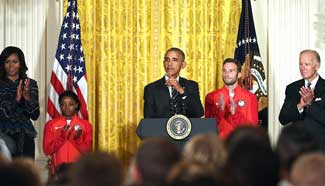BEIJING, Sept. 30 (Xinhua) -- U.S. Congress' overriding President Barack Obama's veto of a bill allowing Sept. 11 victims to sue Saudi Arabia not only has drawn criticism from the kingdom, but also is considered by many as a move that could bring negative impacts.
U.S. Congress voted Wednesday to override Obama's veto of the Justice Against Sponsors of Terrorism Act, or JASTA.
The bill, which has now become law, grants an exception to the legal principle of sovereign immunity in cases of terrorism on U.S. soil.
Survivors and families of the Sept. 11, 2001 victims have been trying to sue the Saudi royal family, Saudi banks and charities in U.S. courts, on the grounds that the Saudi government provided financial support for terrorism.
The families' efforts have largely been stymied, in part because of a 1976 law that gives foreign nations some immunity from lawsuits in American courts.
Now with JASTA enacted into law, the families are allowed to move forward with a case they filed in 2003 against Saudi Arabia in a New York federal court.
Saudi Arabia was home to 15 of the 19 al-Qaida hijackers who carried out the Sept. 11, 2001 terror attacks that killed nearly 3,000 people in New York, Washington D.C. area and Pennsylvania. Osama bin Laden, the mastermind of the terror attacks, was also a Saudi national.
Riyadh denies any role in the plotting the terror attacks.
CRITICISM FROM SAUDI ARABIA, UAE
An official at the Saudi Foreign Affairs Ministry said Thursday in a statement that the erosion of sovereign immunity, which has governed international relations for hundreds of years, will have a negative impact on all nations, including the United States.
The official elaborated that JASTA has been opposed publicly by many nations as well as dozens of American national security experts who see the dangers that JASTA presents.
The official hoped that wisdom will prevail and that U.S. Congress will take the necessary steps to correct this legislation in order to avoid any serious unintended consequences that may ensue.
The erosion of sovereign immunity is also a concern among Gulf allies of Saudi Arabia, a powerful member of the six-nation Gulf Cooperation Council that groups Bahrain, Kuwait, Oman, Qatar, Saudi Arabia and the United Arab Emirates (UAE).
UAE Minister of State for Foreign Affairs Anwar Gargash said Thursday that U.S. Congress' move was a "dangerous precedent" in international law that undermines the principle of sovereign immunity and the future of sovereign investments in the United States.
"The populism surrounding the JASTA law overcame the rationality required in matters of international law and investments. It will have long-term and serious implications," Gargash tweeted.
He added the move against Saudi Arabia in the United States was "unreasonable and demagogic." The kingdom, he added, had suffered itself "the most from extremism and terrorism."
"Our reactions at the legal and investment levels should not be hasty. Easing the damage requires focused and joint action. Logic and reason will always prevail," tweeted Gargash.
POSSIBLE NEGATIVE IMPACTS
In opposing the law, Obama has said the bill "would be detrimental to U.S. national interests."
"Enacting JASTA into law, however, would neither protect Americans from terrorist attacks nor improve the effectiveness of our response to such attacks," Obama said.
Analysts on Thursday warned that Saudi Arabia could reduce valuable security and intelligence cooperation with longstanding ally Washington after the congressional "stab in the back."
"I'm afraid that this bill will have dire strategic implications" for the United States, Salman al-Ansari, head of the Saudi American Public Relation Affairs Committee, told AFP.
Saudi Arabia has threatened to sell off hundreds of billions of dollars' worth of American assets held by the kingdom if the United States passes and enacts the bill.
On the other hand, technically, it will be hard to prove a foreign nation is responsible for acts of terrorism, said attorneys and law experts, who expected drawn-out legal wrangling.
Jack Quinn, co-counsel for more than 2,000 family members of Sept. 11 victims, said the plaintiffs will now ask the U.S. Court of Appeals for the Second Circuit to reconsider the issue in light of the new law.
"We will next attempt to complete the development of evidence and find out what the truth is," said Quinn.
However, even under the new law, the White House can still request a court to halt related cases.
The law allows a court to put a proceeding against a foreign state on hold if the United Stats says it "is engaged in good faith discussions" with the country to resolve the claims.










